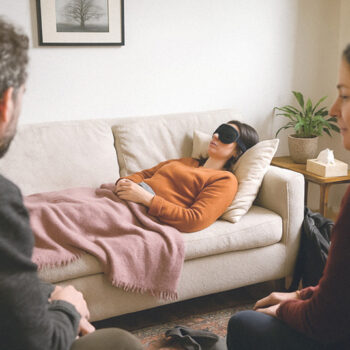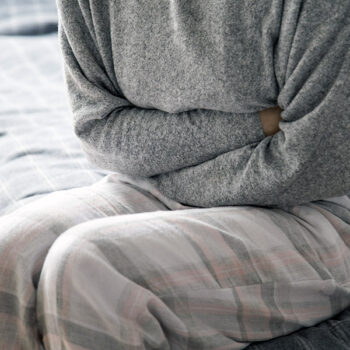Psilocybin: A Hope for Anorexia?

Contrary to popular belief, anorexia nervosa is not just about food. While it is an eating disorder, its causes are far more complex than a mere desire to lose weight. This illness profoundly disrupts the lives of those affected, as well as their loved ones, who often feel powerless. Behind the statistics and diagnoses lie lives shattered by low self-esteem, isolation, and an inner struggle.
Yes, medical advancements exist, but conventional treatments struggle to provide lasting solutions. The challenge is that anorexia is intertwined with other conditions, forming a complex web that is difficult to untangle: depression, trauma, obsessive-compulsive disorder (OCD), or sexual abuse. What role could psilocybin play in all of this?
The Search for New Treatments
To help as many people with anorexia as possible, new tools must be found. And this is where an unexpected avenue emerges: psilocybin. Its hallucinogenic effects and its action on the brain could help reshape the approach to anorexia treatment.
Can Psilocybin Treat Anorexia?
Because it sits at the crossroads of multiple disorders, anorexia resists conventional treatments. This makes recovery a long and difficult process, marked by progress and relapses. As a result, anorexia has one of the highest mortality rates among psychiatric illnesses.
While it is not a miracle cure, magic mushrooms offer five key hopes:
- A lasting shift in body perception.
- A temporary or permanent reduction in anxiety disorders.
- A change in the relationship with food.
- A faster response to eating disorder treatments.
- A less burdensome long-term treatment approach.
Over the past few years, psilocybin has piqued the interest of psychiatric researchers.
Studies on the Link Between Psilocybin and Anorexia
Study at the University of California, San Diego
In 2024, this institution conducted an innovative clinical trial to assess the use of psilocybin in treating anorexia nervosa. The study focused on its efficacy and safety and involved only female participants. Ten patients received a single 25 mg dose under the supervision of a therapist.
The study concluded that “psilocybin could be helpful in facilitating significant psychological change in some patients.”
The published results also included striking figures:
| Observed Results Among Participants | Percentage of Participants |
|---|---|
| Experience ranked among the top five most meaningful life events | 90% |
| Reduced emphasis on physical appearance | 60% |
| Improved quality of life and self-perception | 70% |
| Reduction in eating disorder symptoms after 3 months | 40% |
A Vast Field of Research
This small sample is still too limited to draw medical conclusions. As of early 2025, two other studies are ongoing:
- Compass Pathways is studying the effects of a single dose of psilocybin or a placebo. The 60 participants receive psychological support from trained therapists.
- Johns Hopkins University is investigating “the effects of psilocybin, particularly whether it can help treat anorexia.”
However, minors are – and will remain – excluded from these studies. The effects of hallucinogenic mushrooms on brain development are poorly understood and rarely studied. All clinical trials are strictly limited to participants over the age of 25.
How Psilocybin Affects Anorexia
But how does psilocybin work on anorexia? First, it is important to understand that it interacts with serotonin receptors. This well-known neurotransmitter plays a role in regulating mood and eating behaviours.
Years ago, researchers at King’s College London demonstrated that psilocybin can temporarily reconfigure neural networks. Under its influence, the brain’s connections become more flexible. For a limited period, change becomes easier. Rigid thought patterns, characteristic of obsessive disorders, begin to loosen.
A Complement to Traditional Therapies
This is precisely when personal work or therapy can become more effective. Psilocybin is not a cure but rather a springboard in a traditional therapeutic process. In clinical trials on depression, patients have described gaining perspective on their emotions and experiencing a mental reset. Applied to eating disorders, this could help patients reconsider their relationship with food and their bodies.
Conventional treatments typically combine several approaches:
- Psychotherapy;
- Cognitive-behavioural therapy (CBT);
- Nutritional support;
- In some cases, hospitalisation.
Antidepressants or antipsychotic medications are sometimes prescribed. Unfortunately, their results are mixed—some patients are resistant to them, while others relapse.
Current Knowledge About This Disorder
As previously stated, anorexia nervosa is not just about refusing to eat. It is a disorder that involves biological, psychological, and environmental factors.
Neuroimaging studies have revealed that, in people with anorexia, the brain’s reward circuit functions abnormally. Normally, eating provides humans with a sense of satisfaction. However, for individuals with eating disorders, this sense of relief comes from controlling their food intake.

Predisposition
Social influences also play a role. The idealisation of thinness and contradictory messages about body image reinforce the disorder. However, contrary to common belief, anorexia is not simply a matter of lacking willpower in the face of societal pressures. In reality, there is a genetic and psychological predisposition linked to trauma management.
The Reality of Risks
Of course, eating regularly and maintaining a balanced diet is essential for all living beings. This is why the risks associated with anorexia must be taken seriously.
Beyond physical complications—such as heart problems, osteoporosis, and infertility—anorexia is frequently accompanied by depressive and anxiety episodes. The suicide rate among people with this disorder is significantly higher than that of other psychiatric illnesses.
Moreover, this illness affects vulnerable individuals, sometimes very young or socially isolated. This is why finding effective and low-burden treatments is crucial.
What Lies Ahead?
Before magic truffles-based treatment can become widely available, further clinical trials will be necessary. The correct protocol must also be identified, as guidance is key to a successful psychedelic experience. The quality of the set and setting is what distinguishes psilocybin retreats and assisted therapies from unsupervised, uncontrolled experiences.
If research continues to confirm its efficacy, psilocybin could pave a new path for treating anorexia nervosa, potentially helping countless individuals worldwide.
FAQ on Anorexia
How many doses of psilocybin are needed to cure anorexia?
Psilocybin does not cure eating disorders. That is the role of therapy. Psychedelic mushrooms can enhance the depth and speed of therapy, but it is impossible to predict how many psychedelic experiences would be necessary to help someone.
Can a teenager attend a psychedelic retreat?
Absolutely not. By definition, a teenager is still developing—neurologically, hormonally, and physically. This is not the right time to introduce a psychedelic substance. In extreme emergencies, only a specialised psychiatrist could prescribe psilocybin-assisted therapy.
Is it necessary to go to the Netherlands for an anorexia retreat?
One can travel to the Netherlands for a legal psychedelic experience. A retreat provides a safe environment that maximises benefits and minimises risks. However, a retreat is not a therapy for anorexia.
What are the effects of magic mushrooms?
Psychedelic substances induce an altered state of consciousness where people may experience visual hallucinations, intense emotions, or deep insights. For eating disorders, this can help individuals understand their condition or distance themselves from obsessive food control.
Can someone is very underweight take magic mushrooms?
Yes, but two precautions should be taken: for women under 45 kg and men under 60 kg, the dose should be adjusted, and a cardiac check-up is recommended beforehand. (These thresholds also depend on the individual’s height.)
Is it enough to just eat to recover?
No, anorexia is not just about food. It involves body image issues, self-esteem problems, and psychological factors. Recovery requires a comprehensive therapeutic approach.
Does anorexia only affect women?
No, let’s take the case of the USA as an example. According to the National Eating Disorders Association, anorexia nervosa affects approximately 1.2% of the population. Three-quarters are women, and one-quarter are men. Moreover, a study reveals that consultations for eating disorders increased by 65% between 2018 and 2022.
Do all people with anorexia make themselves vomit?
Not at all. Some individuals control the amount of food they consume—this is known as restrictive anorexia. In anorexia with binge-eating/purging episodes, there are periods of excessive food intake followed by compensatory behaviours such as self-induced vomiting or the use of laxatives.
Are people with anorexia always extremely thin?
No, it is possible to have a weight considered normal while still suffering from anorexia. Weight or thinness does not necessarily reflect the severity of the disorder.
Written by Arnaud Beauregard,
Founder of Tangerine Retreat in 2022, I have followed several paths: initially trained as an engineer and then as an entrepreneur, I later pursued training in hypnotherapy to better understand the inner workings of the human mind. I discovered psychedelics at the age of 55. My encounter with altered states of consciousness proved to be a profound revelation which, over time, became a genuine passion.
Last updated on 6 October 2025





